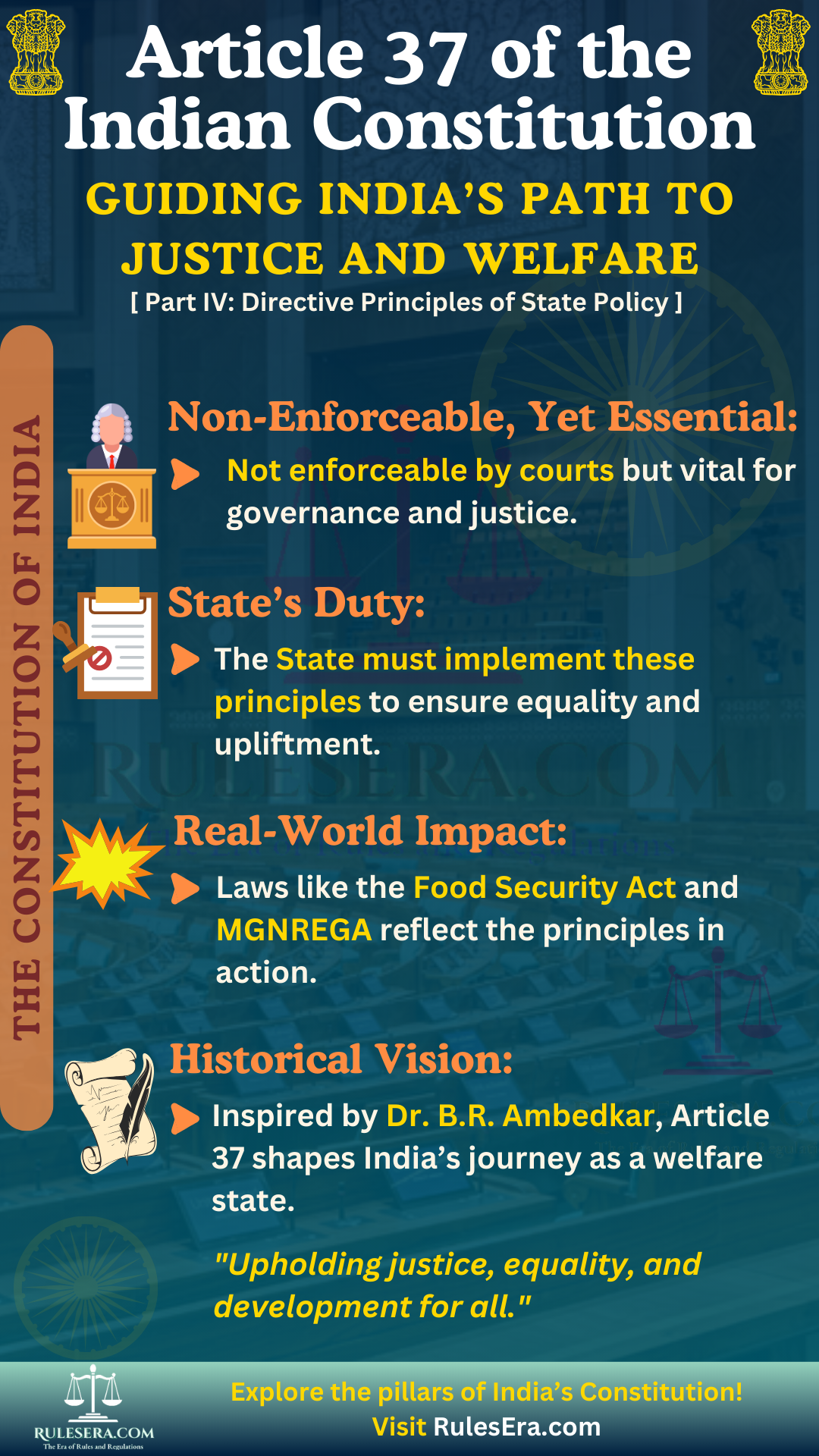Part IV: Directive Principles of State Policy
Article 37: Application of the principles contained in this Part

--- Original Article ---
The provisions contained in this Part shall not be enforceable by any court, but the principles therein laid down are fundamental in the governance of the country, and it shall be the duty of the State to apply these principles in making laws.
Explanation
Article 37 emphasizes that although the Directive Principles of State Policy are non-justiciable, they are critical to the governance of the country. These principles serve as guidelines for the government in legislative and policy-making processes, ensuring social justice, equality, and development.
Key Aspects of Article 37
- Non-Enforceability by Courts: The provisions are not enforceable by any court, meaning individuals cannot claim legal rights based on the Directive Principles.
- Fundamental Nature in Governance: Despite being non-enforceable, these principles are recognized as essential for guiding the government in its functioning.
- State's Duty to Apply Principles: The State is expected to apply these principles when making laws and policies, fulfilling its constitutional duty.
Real-Life Applications
An example is the Food Security Act, 2013, enacted to address hunger and malnutrition, showcasing the application of Directive Principles. Another example is the Mahatma Gandhi National Rural Employment Guarantee Act (MGNREGA), 2005, which aligns with the right to work under the Directive Principles.
Historical Significance
Article 37 reflects the Indian Constitution's vision of a welfare state, incorporating ideals from the Irish Constitution and Gandhian principles of social justice. Its historical importance lies in guiding modern legislation for social and economic progress.
Legislative History
Article 37, initially Article 29 during the drafting phase, underwent significant debates. The Constituent Assembly's discussions focused on whether these principles should be enforceable, eventually deciding to keep them as non-justiciable guidelines.
Debates and Deliberations
The discussion on Article 29 of the Draft Constitution in the Constituent Assembly centered on the enforceability of the Directive Principles of State Policy.
Professor K.T. Shah proposed an amendment to substitute Article 29, arguing that the principles should be enforceable obligations of the State rather than mere aspirations. He praised Dr. B.R. Ambedkar for supporting enforceability but criticized the current provision, which, according to Shah, implied that the courts would lack authority to enforce these ideals. He compared the article to a "cheque payable when able," suggesting it weakened the State's commitment to addressing the people's needs.
Prof. Shibban Lal Saksena, after initially proposing that the Directive Principles become Fundamental Rights after ten years, withdrew his amendment. He expressed confidence that their inclusion in the Constitution would ensure that future legislatures would respect these principles, even if individuals could not directly approach courts for their enforcement.
In conclusion, the House rejected the proposed amendments and accepted Article 29 as part of the Constitution, keeping the Directive Principles as non-justiciable guidelines for governance rather than enforceable rights.
Frequently Asked Questions (FAQs):
No, they are not enforceable by courts. However, the State has a duty to apply these principles when framing laws and policies.
Non-enforceability ensures flexibility, allowing the State to apply these principles progressively as resources permit, without immediate judicial intervention.